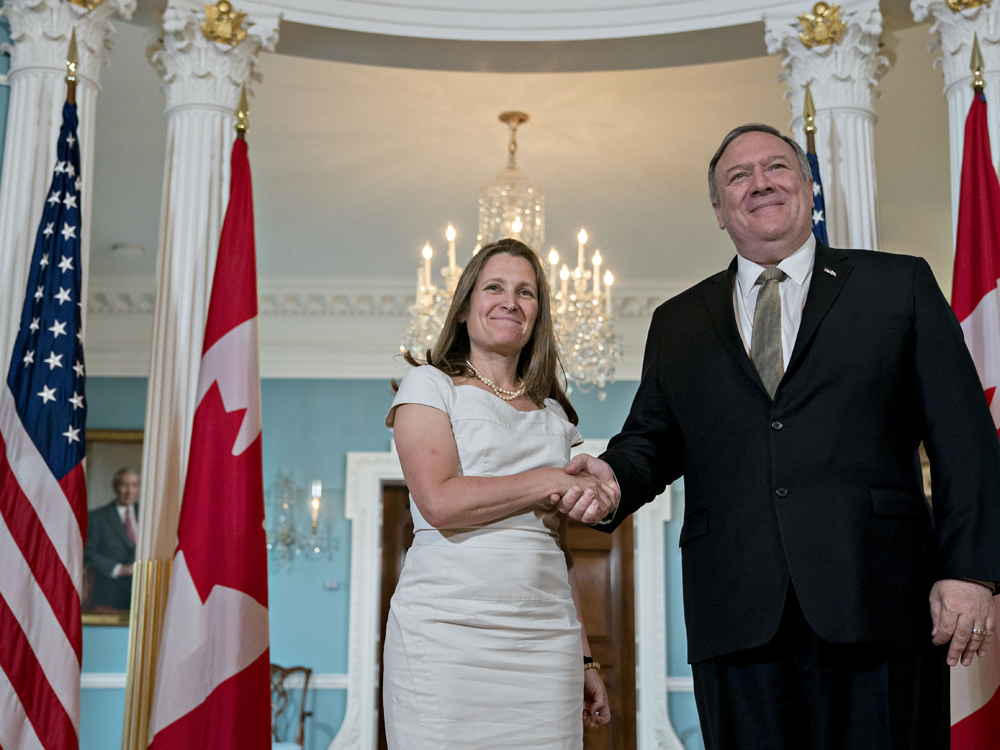OTTAWA — The Liberal government is prepared to recall Parliament this summer to ratify the new North American trade agreement, The Canadian Press has learned.
As much as the government wants to move “in tandem” with the United States toward final legal approval of the new agreement it doesn’t want to get too far ahead, says a senior government official who wasn’t authorized to speak for attribution because of the sensitivity of the process.
The source says it is not clear obstacles in the U.S. Congress can be overcome before the House of Commons’ session expires next week.
“We want to move forward with them as closely as possible but obviously they’re in a more difficult situation, or a more complicated situation, with regards to the ratification,” said the source.
“There’s always the possibility of bringing the House back,” the source said. “We’re not at a place yet where know whether that will be necessary.”
Foreign Affairs Minister Chrystia Freeland is in Washington Wednesday for meetings with U.S. trade czar Robert Lighthizer and Secretary of State Mike Pompeo, and she will be on Capitol Hill Thursday for talks with Republican and Democratic lawmakers.
The government expects to have a better sense of the way forward for Canada after those meetings.
U.S. Vice-President Mike Pence said he hoped his country’s Congress would ratify the United States-Mexico-Canada Agreement by the end of the summer during his recent visit to Ottawa, while the Mexican ambassador to Canada has said his country’s Senate will give final approval at its own extended legislative session this coming Monday or Tuesday.
“We don’t want to get too far ahead of the other countries,” said the source.
In the meantime, Canada is moving ahead in the Commons with the ratification process. Prime Minister Justin Trudeau formally introduced Bill C-100 two weeks ago and MPs debated the ratification bill on Tuesday in second reading.
In her speech to Parliament on it, Freeland reiterated that the final hurdle to ratification was cleared last month when the U.S. lifted its punitive U.S. tariffs on Canadian and Mexican steel imports.
Freeland noted the united front that Canadian politicians, business and union leaders presented in dealing with the Trump administration, which forced an often tense and acrimonious renegotiation of the North American Free Trade Agreement. President Donald Trump has called NAFTA the worst trade deal in U.S. history and repeatedly threatened to rip it up.
“Throughout the negotiation, we kept our cool in the face of uncertainty and worked on getting a new agreement that would preserve jobs and market access, and in turn, support the middle class and economic growth,” Freeland said.
“We succeeded in preserving key elements of NAFTA, including Chapter 19, the all-important dispute settlement mechanism. No trading relationship is ever without irritants. In the case of the Canada-U.S. relationship, we are aware of the importance of maintaining an effective mechanism to settle disputes. For us, this was non-negotiable.”
During the debate, opposition MPs urged the government not to rush to ratification because of uncertainty in the U.S.
New Democrat MP Tracey Ramsey said the new deal would raise drug prices for Canadians, which she called a “regressive provision.”
Ramsey said the pact should be renegotiated but Freeland held firm to the government’s position that the deal was done, and that starting new negotiations would be opening a “Pandora’s Box.”
“There is no rush to ratify this agreement. The U.S. has not even put this on the floor of its Congress,” Ramsey said.
Conservative MP Dean Allison urged the government to “move prudently” towards ratification.
“We have already seen the Democrats not wanting to give Mr. Trump any kind of victory. Therefore, we have not seen a lot of co-operation from the U.S.,” said Allison.
“If we get too far ahead of ourselves regarding ratification, that could be an issue. Therefore, I would echo the comments of my colleague from the NDP that as a result of the uncertainty we see in the U.S., we need to be cautious as we move forward with ratification.”

